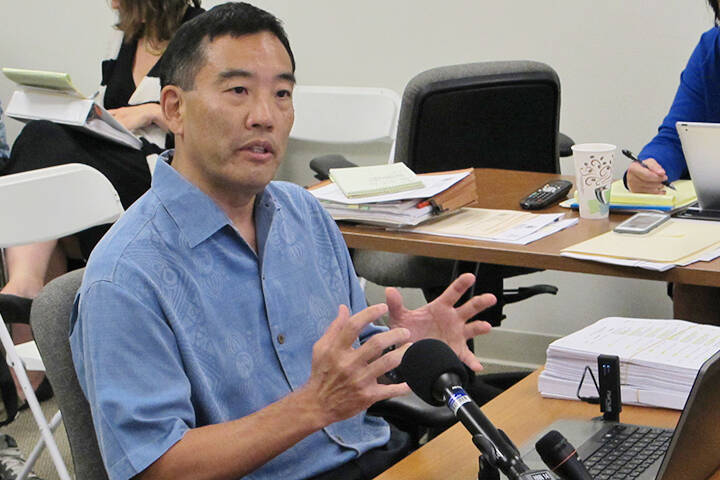The war of words and battle of wills continue between the state auditor and chairwoman of a special House committee investigating the handling of two critical audits of state agencies’ mishandling of state lands.
Auditor Les Kondo wrote a blistering, six-page letter to the eight members of the special House Investigative Committee on Tuesday, calling its investigation of him and his office illegitimate, inappropriate, outside of the committee’s scope and a continuation of “the Speaker’s (Scott Saiki’s) attack against me and my office.”
Kondo also wrote that the committee’s efforts to interview former and current employees is an intimidation tactic and its pursuit of confidential “work papers” is prohibited by state mandate to enable the auditor’s office to remain independent from the Legislature and provide confidentiality to departments being audited, so people can be candid.
Chairwoman Della Au Belatti, House majority leader, pushed back on Wednesday before issuing another round of subpoenas for documents and witnesses who have been testifying under oath with the option to be accompanied by legal counsel. The hearings are scheduled to stretch into Oct. 28, with several expected to last all day.
Belatti did not go into specific allegations on Wednesday, but hinted at critical omissions in the separate audits that were conducted of land management by the state Department of Land and Natural Resources and state Agribusiness Development Corp., which has extraordinary powers to convert Hawaii’s once robust sugar and pineapple fields into a modern-day economic driver.
“This committee has already heard testimony that there may be something amiss in the scope of these audits and that there are significant — significant — subject areas, whether it is the large parcels of land on Kauai that are some of the most productive farm lands in Hawaii or the numerous types of contracts … that were omitted from the scrutiny by the auditor,” Belatti said.
“There are also grave concerns that the findings and recommendations have not gone far enough,” Belatti said. “It is our job, this committee’s responsibility, to follow up on those areas where we are identifying significant problems in policy mismanagement, malfeasance and fraud. … It is some of these problems that appear to have been omitted completely from the (audits’) findings, recommendations and final reports.”
The House investigation follows Saiki’s previous attempt to slash the budget of the auditor’s office and began six months after Kondo received a scathing 79-page critique, prompted by Saiki, that concluded Kondo had created a dysfunctional workplace and is ill-suited to lead an office that missed audit deadlines. In response, Kondo said the report itself was the result of shoddy, biased and misleading work.
In his letter to the House Investigative Committee members on Tuesday, Kondo repeated his pledge to appear before the committee to discuss the findings of both audits in order to improve management
of state lands by the two agencies.
Kondo — an attorney — repeatedly cited state statutes in defending his office’s independence and what he called the committee’s “abuse of power.”
“I have been subjected to improper questioning by some members into details about our process and our workpapers, which are confidential by law,” Kondo wrote. “Some members have gone as far as to misrepresent our work in their attempts to continue the Speaker’s attack against me and my office.
“… The committee may also be considering requiring our current and former employees and contractors to testify before the committee,” Kondo wrote. “I am compelled to inform you that this harassment, attempt to intimidate, and improper intrusion into the operations of the Office of the Auditor – an independent office established by the Hawai‘i Constitution – is wholly outside the scope of the resolution authorizing the committee and is therefore illegitimate.
“… Rather than protecting and defending an office established in the State Constitution – which every legislator has sworn an oath to do – the committee’s actions pose a real undue threat to our independence by unfairly and unjustly intruding into our process,” Kondo wrote.




